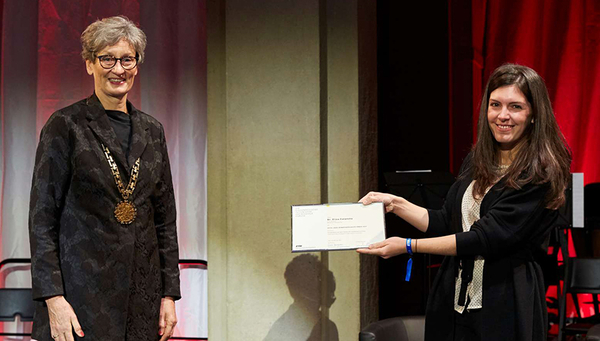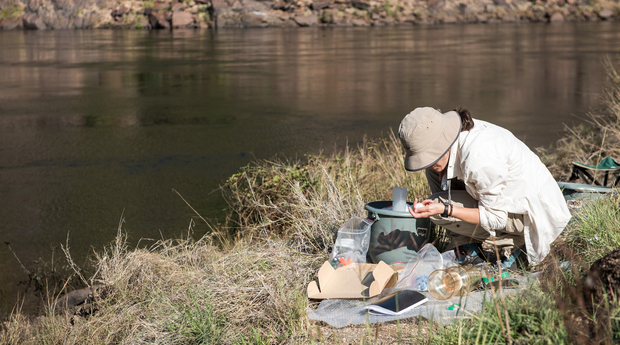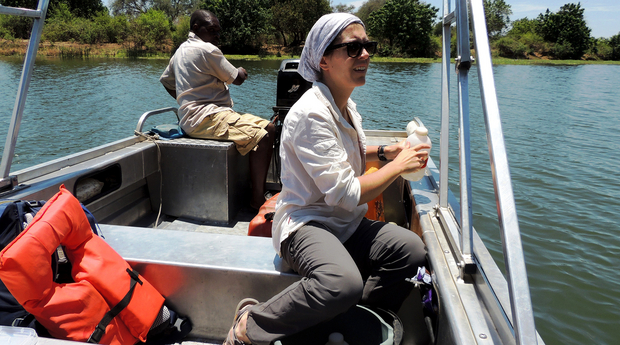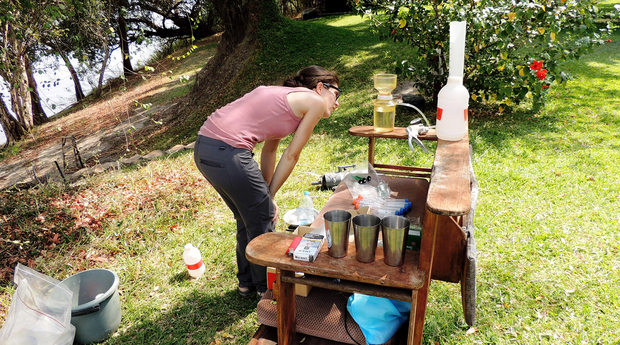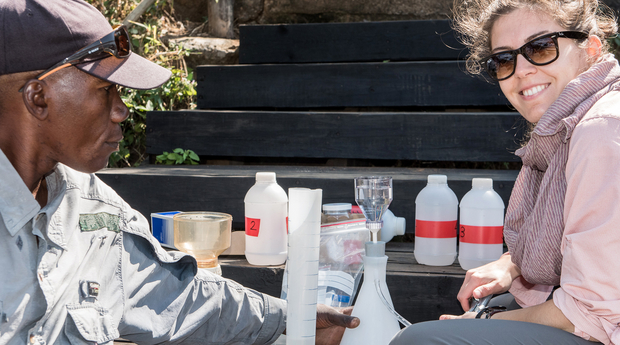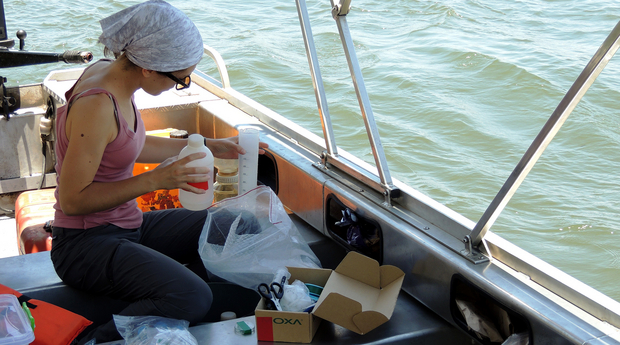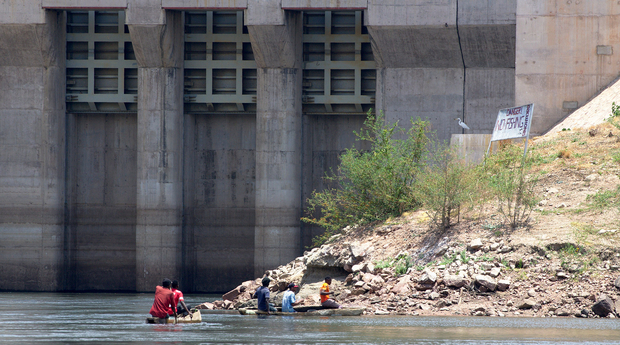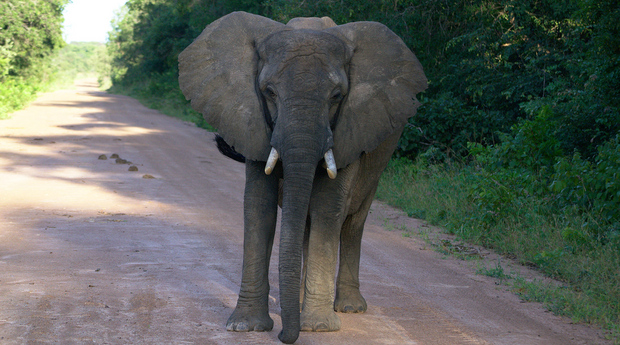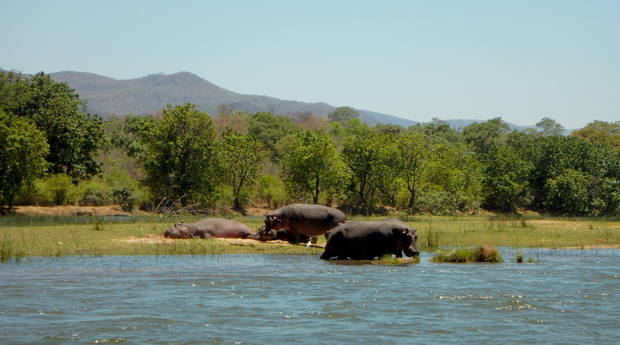Archive detail
Elisa Calamita wins the Otto Jaag Water Protection Prize 2021
November 22, 2021 |
Elisa Calamita’s doctoral thesis in the Eawag Surface Waters Department and at ETH Zurich was part of the Horizon 2020 project DAFNE. The international project is looking for new ways to optimally use the water of the African Zambezi and Omo rivers, while protecting the aquatic ecosystems. Within this framework, the environmental engineer dealt with the question of how dams, especially those for hydropower, influence the water quality of the dammed rivers. The focus of her research was the Kariba Dam on the Zambezi River.
Today, Elisa Calamita works as a postdoc at Eawag. In an interview, she looks back on the years of her doctoral work and reports on the most important experiences, lessons learned and results.
Elisa Calamita, what does the Otto Jaag Water Protection Prize mean to you?
I was surprised when my doctoral supervisor Bernhard Wehrli informed me that the jury proposed me for the prize. I first had to google the prize. I didn’t know it at all. When I got the letter that I had been selected for the award, I was very happy. It is motivating to know that my work is so appreciated.
When you look back on your doctoral thesis, what were the most important insights?
It was a great experience. I learned a lot – for my work as a scientist, but also for myself personally.
From the scientist’s point of view: what did you benefit from the most?
My doctoral thesis was part of a large research project. Finding my place in it was not easy. My doctoral supervisor also gave me a lot of freedom. This trust in me was quite a challenge at first. But at some point, it clicked. I knew I had to take my project into my own hands. Today I know that the freedom gave me the opportunity to try out different things and develop my skills as a researcher. And when I came to Bernhard with suggestions, he was always very supportive. That’s how I learned how to approach a research question and design a research project. That was an important step for me, which I benefit greatly from today.
I also learned a lot from working with researchers from Africa, especially with Professor Imasiku Nyambe from the University of Zambia and his group. Bernhard has been in contact with him for many years. This long-term cooperation, based on mutual trust, was crucial for the success of my work. It enabled us to build up a good relationship with the local authorities and experts in the region. This helped us a lot when it came to collecting water samples, for example, or filling out forms that allowed us to enter the dam. This showed me how important human connections are to build trust with local people even before you start the actual research work.
And on a personal level, what were the most important experiences for you?
Basically, it was an important personal development for me. A doctoral thesis is simply a 360-degree experience that moves you forwards in many areas, for example in terms of self-confidence.
Both the interdisciplinary character of the project and the multicultural environment were exciting challenges. We had to find a common vocabulary among scientists with different backgrounds and the right way to communicate among different project partners.
Doing fieldwork in Africa was a completely new experience for me and being in the Zambezi River’s water was very exciting. During our river sampling I discovered a real fear of animals. In Zambia I experienced my first encounter with an elephant; he chased us in our car – that was scary. Then a crocodile tried to eat our instrument and he managed to break it; that was very frightening.
What are the most important results of your doctoral thesis?
With my doctoral thesis, I was able to show that there are two processes due to river damming that influence water quality: the deposition of sediments and nutrients and the thermal stratification in the reservoirs. Stratification occurs in most, if not all, large low-latitude reservoirs on at least a seasonal basis. Among other things, this leads to changes in water temperature and oxygen content in the reservoir water, which in turn affects the river ecosystems downstream.
For the sustainable management of a dam, it is therefore important to analyse the condition of the reservoirs in detail. In the case of the Kariba Dam, the largest artificial reservoir in the world by volume, the cooperation between the two countries, Zambia and Zimbabwe, whose border runs exactly through the middle of the dam, could potentially mitigate the actual downstream water quality alterations. These results reveal that transboundary dams may offer additional opportunities for optimised management.
Moreover, we assessed the carbon budget of the Kariba Reservoir and we found that the atmospheric CO2 emissions from the Zambezi River surface downstream of Kariba fluctuate strongly over different timescales, and failing to account for these fluctuations could lead to errors in the carbon budgeting of the hydroelectric reservoir. (See Eawag News of 14 June 2021: “When hydropower plants emit carbon dioxide”.)
Are the findings being implemented at the Kariba Dam today?
Not yet in practice, as far as I know. But the results are being discussed, as they are struggling with some water problems on the Zambezi, for example droughts and declining fish abundance. But the question of how to manage the dams without destroying the environment downstream is also on the minds of the authorities and operators. I hope that my research results can be a little puzzle piece that may help the sustainable management of the wonderful Zambezi River.
Otto Jaag Water Conservation Prize
Prof. Dr Otto Jaag was a water protection pioneer who was recognised not only throughout Switzerland but also internationally, and he headed Eawag as Director from 1952 to 1970. The “Otto Jaag Water Protection Prize” fund was established at ETH Zurich in 1980, two years after his death. The price honours outstanding dissertations and master theses from ETH Zurich in the field of water protection and hydrology. The prize money is 1,000 Swiss francs.
Cover picture: ETH Zürich, Giulia Marthaler
Funding / Cooperations
- Eawag
- Horizon-2020-Projekt DAFNE

